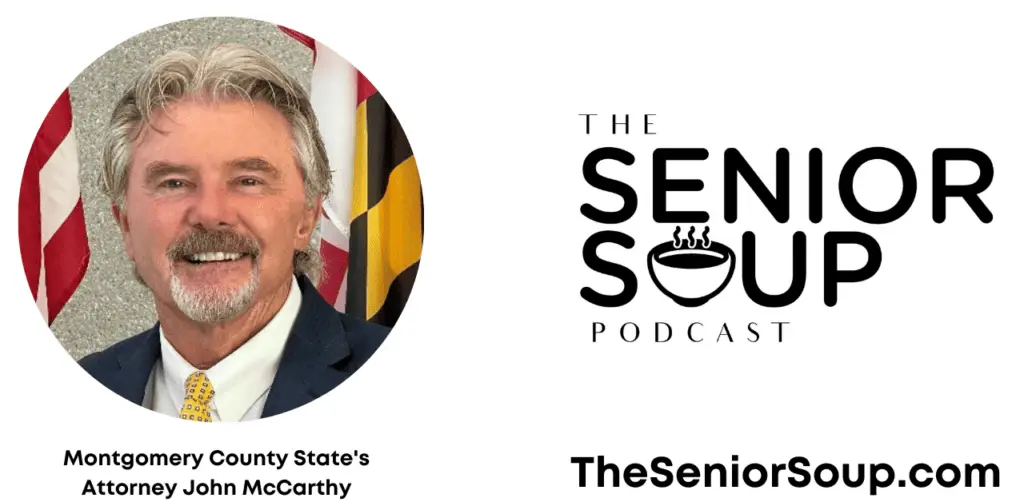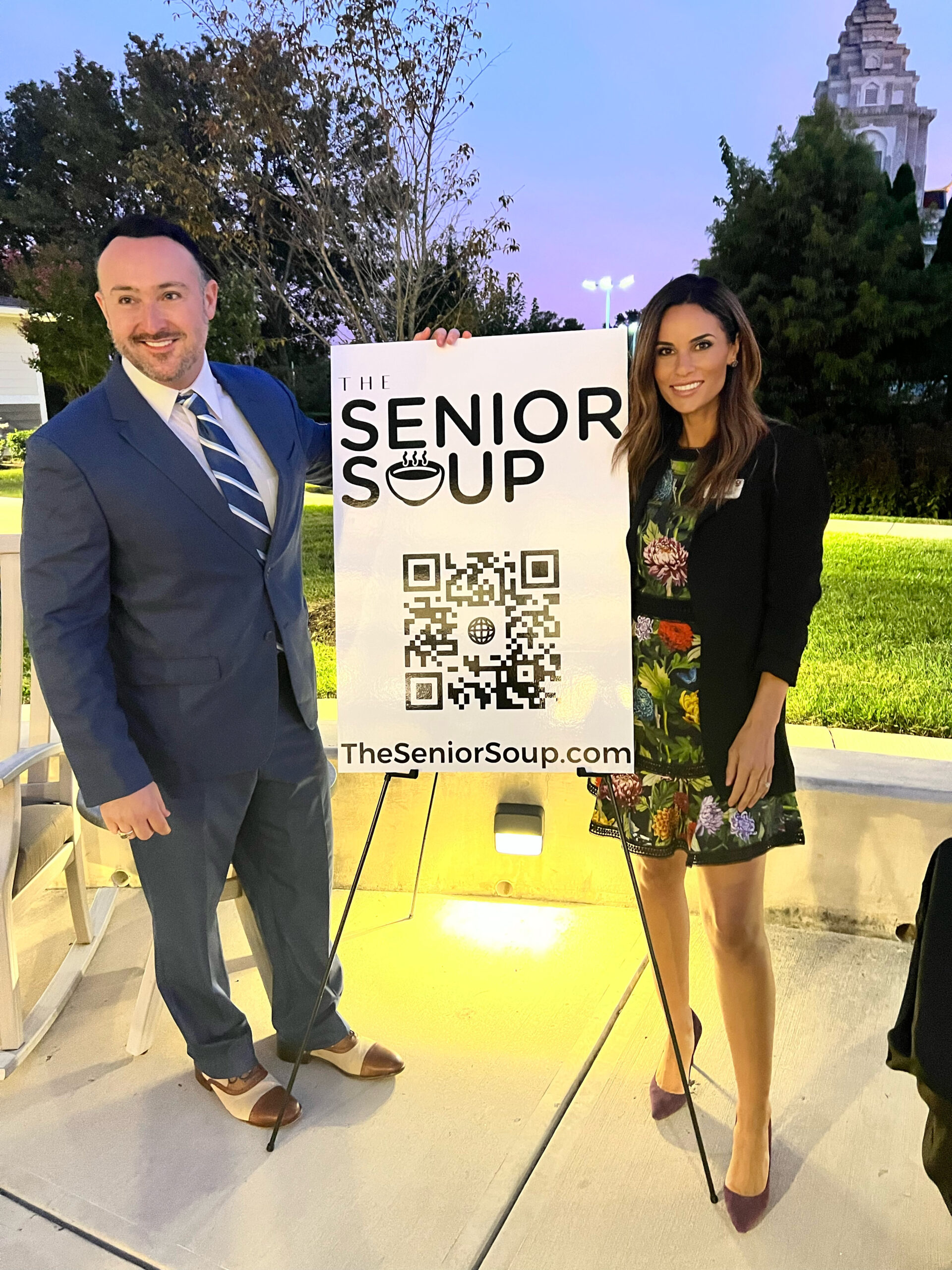Have you ever Googled “What to do if your elderly parent is being scammed?”
In episode three of The Senior Soup Podcast, Montgomery County State’s Attorney John McCarthy joined Raquel Micit and Ryan Miner on The Senior Soup Podcast to discuss senior scam prevention and how their adult children can help protect their parents from senior scams.
Mr. McCarthy shared how his office works with several Montgomery County organizations and senior living communities to help recognize elder abuse and prevent elder abuse and scams before they happen.
As an adult child of a vulnerable senior still living independently, have you ever Googled “What to do if your elderly parent is being scammed?”
This podcast lists the types of scams that Maryland older adults are vulnerable to and how to prevent them.
Protecting Our Elderly Parents & Neighbors From Being Scammed
As healthcare and senior services professionals, we’ve seen firsthand the daily challenges and threats that older adults face.
The Senior Soup’s mission is to be a beacon of hope and a shield against those who prey on the vulnerability of our elders.
With the senior population increasing, the urgency to act and educate has never been more critical.
What Maryland Older Adults Need To Know About The Latest Scams
This podcast episode underscored a powerful truth: education is our best defense against victimization.
Knowledge empowers our older adult community to recognize and evade scams before they happen.
In this podcast, we discussed the various educational programs in Montgomery County, such as Oasis and OSHA, which have been instrumental in equipping seniors with the knowledge they need to stay safe.
What To Do If Your Elderly Parent Is Being Scammed?
Scams come in many forms – from IRS frauds to fake home repair offers.
The heart-wrenching reality is that a scammer may be someone an older knows and trusts.
Montgomery County States Attorney McCarthy discussed the importance of recognizing the signs of a scam and the strategies employed by scammers, such as phishing emails and phone scams.
Vigilance is key!
Are You Aware Of Phone Calls That You Do Not Recognize?
Seniors are advised against answering phone calls from numbers they do not recognize.
Scammers often use phone calls as a direct method to deceive or extract personal information from seniors. If the call is necessary, the caller will likely leave a message or find another way to reach out.
Did You Know That Scammers Use Phishing Emails?
What’s a phishing email?
A phishing email is a fraudulent message designed to trick recipients into revealing sensitive information such as personal details, passwords, or financial data.
These emails often appear to come from legitimate sources, such as banks, government agencies, or trusted companies and may contain links to fake websites that look authentic.
Many older adults are particularly vulnerable to phishing emails for several reasons:
- Lack of Familiarity with Technology: Some older adults may be less familiar with modern digital security practices and the appearance of fraudulent emails.
- Trusting Nature: Our elderly population might trust communications that appear official, making them more likely to click on links or provide requested information.
- Isolation and Loneliness: Many older adults are more inclined to respond to emails that promise social interaction or assistance, even if they are suspicious.
- Cognitive Decline: Age-related cognitive decline can make identifying and resisting scams harder.
- Lack of Awareness: Some older adults might not be as informed about current scam tactics or how to protect themselves online.
It’s important for older adults and their families to educate themselves about recognizing phishing emails and to verify the authenticity of any suspicious messages before responding.
Older adults are cautioned not to open unrecognizable emails and to contact businesses and organizations through a verified number or legitimate email address.
Don’t Forget About Maryland Seasonal and Opportunistic Scams
Awareness of seasonal trends in scams, such as IRS scams around tax time or traveler scams in spring, can help seniors be more vigilant during these periods.
Recognizing these scams’ patterns and timing can be crucial in avoiding victimization.
Families May Financially Expliot Their Loved Ones
Many financial scams involve someone an older adult knows – often a family member.
Recognizing unusual financial requests or transactions involving close contacts can be a red flag for potential exploitation.
Home Repair and Home Service Scams in Maryland
Seniors should be wary of individuals offering roof repair or tree-cutting services without solicitation, especially when these offers come at high costs and without the necessity of the service.
By understanding and recognizing these signs and tactics, Maryland’s aging population can avoid becoming the victim of a scam.
How Older Adults & Their Families Can Take Action To Avoid Senior Scams
- Research “senior scams” in Maryland to learn how to avoid them;
- Use reputable agencies to hire caregivers, emphasizing the importance of thorough background checks, including at the state and federal levels;
- Seniors can look out for one another, especially by observing and reporting potential scams that target older adults;
- Seniors and their families should verify the legitimacy of emails and phone calls to prevent phishing and other scams;
- Please try to refrain from answering phone calls using unrecognized numbers;
- Older adults should be cautious about who they allow into their homes and ensure that any service providers with access to their homes are adequately vetted;
- Families and caregivers should maintain open communication and oversight about their loved one’s financial affairs to prevent exploitation;
- To mitigate the risk of fraud, more than one person (a trusted loved one) should have visibility into a senior’s financial records and transactions;
- Encourage listening to and sharing information from resources like the podcast episode to increase awareness and education on preventing senior scams.
Building a Safer Community Through Advocacy
A crucial aspect touched upon in this podcast was the significant underreporting of crimes against older adults, with a startling statistic revealing that only 4% of such crimes are reported by the victims themselves.
This underreporting underscores the importance of community vigilance and the collective responsibility to protect our elderly population.
It is a potent call to action for everyone in the community to be more observant and proactive in safeguarding seniors against scams and exploitation.
Montgomery County Senior Scam Prevention Resources
- Washington Metro Oasis, located at Montgomery Mall, serves the senior community with various educational programs. You can contact them at (240) 800-3745.
- OSHA, formerly associated with Johns Hopkins, now offers live classes at the Black Rock Center for the Arts in Germantown, focused on continuous education for seniors.
- Specialized units within the Montgomery County State’s Attorney’s Office are specifically trained to prosecute crimes against seniors, including financial crimes and physical abuse.
- The Montgomery County Consumer Protection Agency, led by Eric Friedman, is a collaborative effort to address issues threatening seniors.
Connect with Raquel through her LinkedIn profile.
How The Senior Soup Can Help Older Adults & Their Families
- Expert Interviews: Featuring healthcare professionals and senior service providers to offer insights and guidance.
- Resource Hub: Providing a comprehensive resource guide for senior resources, from home care options and healthcare providers to financial and estate planning.
- Advocacy and Education: Empowering seniors and their families with the knowledge to make critical life decisions.
Connect With The Senior Soup Podcast Hosts Raquel and Ryan
We encourage listeners to contact us with topics they want to learn more about.
Contact Raquel and Ryan at:
- Ryan: Ryan@TheSeniorSoup.com
- Raquel: Raquel@TheSeniorSoup.com
- Call or Text The Senior Soup at (202) 350-2674
- Facebook Messanger: http://m.me/107672818779042
To explore our healthcare guides and comprehensive resource directory, please visit our Senior Soup Homepage.
Subscribe and Listen to The Senior Soup Podcast
Please visit our Senior Soup Podcast homepage for a comprehensive listing of each of our podcast episodes.
You can listen and subscribe to our podcast on many of the major podcast directories, including:
Follow The Senior Soup on Social Media
Thank You For Listening!
Thank you for joining us on this journey.
The Senior Soup is committed to providing valuable, engaging, and trustworthy content to support our older-adult community.


